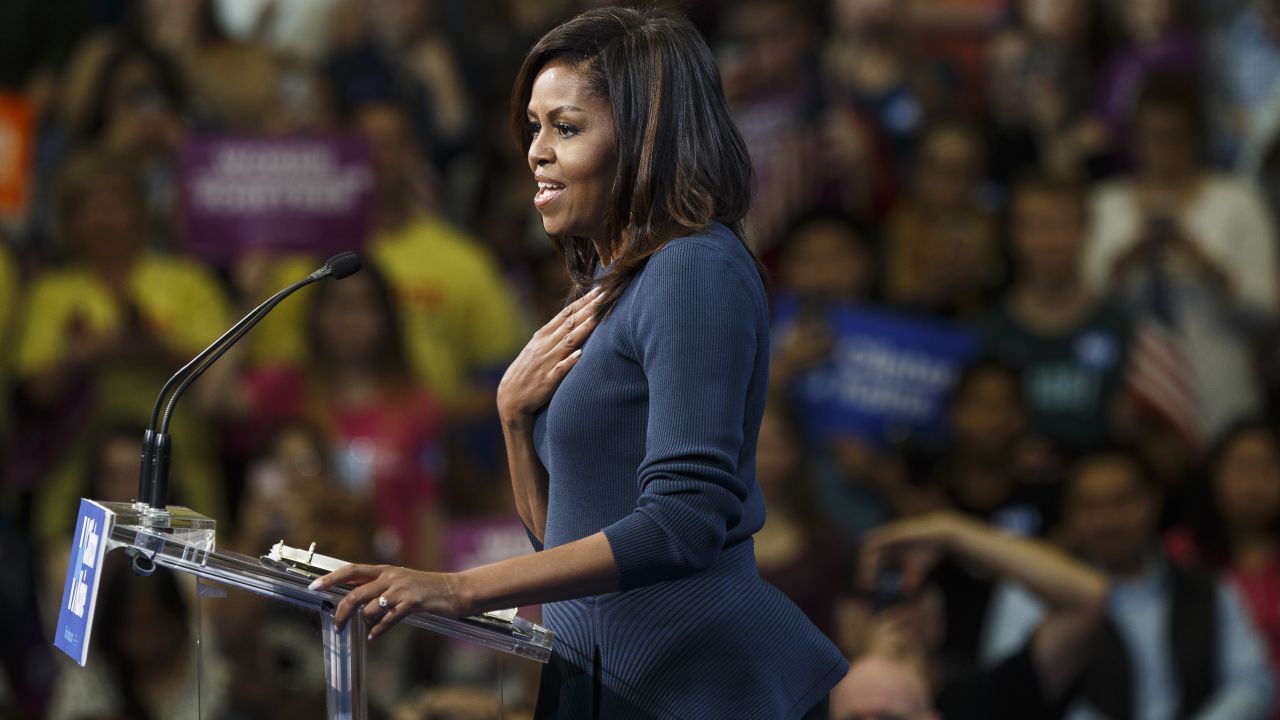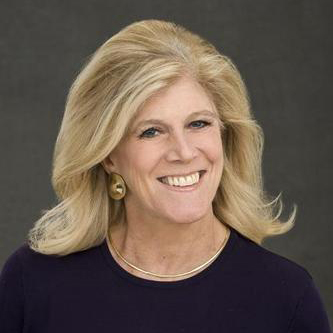
US First Lady Michelle Obama speaks during a campaign rally in support of Democratic Presidential nominee Hillary Clinton at Southern New Hampshire University in Manchester, NH on Oct. 13, 2016. (Photo by Keith Bedford/The Boston Globe via Getty Images)
“This … has been a week of profound contrast,” said Michelle Obama, in a moment of sublime understatement during an emotionally raw speech on Thursday that squished Donald Trump like a cockroach without ever mentioning his name. Her unusually personal and passionate condemnation of his gutter politics and garbage behavior sent her to the top of the trending list on Twitter as grateful fans high-fived the most outspoken defense of moral authority by a first lady since Hillary Rodham Clinton equated women’s rights with human rights in Beijing in 1995:
Amid the din of an ugly and clamorous, @MichelleObama speech in NH stood apart for its moral clarity and genuine passion.
— David Axelrod (@davidaxelrod) Oct. 13, 2016
.@FLOTUS, I have a quick question: What's it like being Master of the Universe? https://t.co/ofNF249y4m
— Misha Collins (@mishacollins) Oct. 14, 2016
In the ugliest election ever, Michelle Obama's takedown of Trump was truly beautiful – @FLOTUS pic.twitter.com/IoXlzIpVlV
— Mic (@mic) Oct. 13, 2016
.@FLOTUS, I'm in awe. Thanks for putting into words what's in so many of our hearts. -H
— Hillary Clinton (@HillaryClinton) Oct. 13, 2016
It was, of course, a campaign stump for the Clinton-Kaine ticket, and the popular first lady delivered a rousing and committed articulation of why Hillary Clinton should and will be elected president. But the speech began with that contrast between Trump’s sleazy conduct and her good works.
“See, on Tuesday at the White House, we celebrated the International Day of the Girl and Let Girls Learn,” Obama began, warmly citing the initiative she’s led to encourage and support the education of girls around the world. I watched the film about her project on CNN Wednesday night, and understood her concern for girls from Liberia and Morocco whose struggle to go to school every day demands mountains of courage. That commitment was even more evident at the White House on Tuesday, where Obama’s voice broke after screening the film for the first time. “We’ve all had our doubts, we’ve all had our failures, our crushing failures,” she said to the young women who have borne far beyond their years. “But you rise up!” According to Kayce Freed Jennings, co-founder of The Documentary Group, which produced the film, “When she addressed the girls, it was electric – her belief in them and who they can be and what they can achieve. You could feel it.”
In the New Hampshire speech, Obama recalled, “I wanted them to understand that the measure of any society is how it treats its women and girls. And I told them that they deserve to be treated with dignity and respect, and I told them that they should disregard anyone who demeans or devalues them, and that they should make their voices heard in the world. And I walked away feeling so inspired…”
Then came the exhale. Following the revelation of Trump’s salacious boasts about accosting women in the “Access Hollywood” tape, allegations emerged about his unwelcome attacks on a growing number of strangers, employees and visitors: encircling one like an octopus, violating another with an unwanted kiss on the mouth, and a third with his tongue down her throat. He was recorded laughing with Howard Stern about cruising backstage during adult and teenage beauty pageants when the contestants are naked, and “no men are anywhere, and I’m allowed to go in because I’m the owner.”
“I can’t believe that I’m saying that a candidate for president of the United States has bragged about sexually assaulting women,” Obama said. “I can’t stop thinking about this. It has shaken me to my core.”
Her anger and contempt were contagious, her voice uncharacteristically tremulous. She was absorbing the pain from a serial abuser for all of us, and making it first personal as never before in the public arena. And the response, from Trump and his stand-ins both before and after she spoke, was predictable.
“The claims are preposterous, ludicrous and defy truth, common sense and logic,” Trump said in West Palm Beach, Florida, later on Thursday. “We already have substantial evidence to dispute these lies, and it will be made public in an appropriate way and at an appropriate time very soon.”
Perhaps around the same time as his income taxes are released.
Rush Limbaugh noted Trump’s comment that “when you’re a celebrity, they let you do anything,” and said, “How can there be assault if somebody’s granting permission? How can it be assault if they let you do anything?”
— First Lady Michelle Obama
Newt Gingrich called the claims “30-year-old gossip,” saying “I don’t think it’s relevant.”
I do. And so does Michelle Obama. In her speech she destroyed the false equivalency of “he said/she said,” using her powerful platform to make it clear that what she said that afternoon was far more relevant than anything he or his cronies either said or could say in defense of such behavior. She didn’t just go high when he went low; she soared. And connected.
“I listen to all of this, and I feel it so personally,” she said, meaning it. “The shameful comments about our bodies. The disrespect of our ambitions and intellect. The belief that you can do anything you want to a woman. It is cruel. It’s frightening. And the truth is, it hurts. It hurts. It’s like that sick, sinking feeling you get when you’re walking down the street, minding your own business, and some guy yells out vulgar words about your body.”
She knows because she is female, because she – because every woman – has felt it. She even got the history right:
“It reminds us of stories we’ve heard from our mothers and grandmothers about how back in their day the boss could say and do whatever he pleased to the women in the office. And even though they worked so hard, jumped over every hurdle to prove themselves, it was never enough. We thought all of that was ancient history, didn’t we?”
I sure did. It was 1979 when I was at ABC News that I did my first story on sexual harassment — perhaps the first network news piece on the ugly variation on sex discrimination. The concept was so novel, I had to spell it out on screen, and define it. To illustrate it, I used a scene from a movie – it was always played for laughs – of the lustful boss chasing his hapless secretary around the desk. Such innocent times: I talked about dealing with “a comment, a pinch or an unwanted proposition.” One of the victims took it further. Her boss, she said, “told me, ‘You’re gonna screw me or be canned.’” There were, I pointed out helpfully, now solutions: the law, the courts. But as Obama wisely noted in her speech, “here we are in 2016 and we’re hearing these exact same things every day of the campaign trail.” Simply because “all of us are doing what women have always done. .. Just trying to get through it, trying to pretend like this doesn’t really bother us.”
Back in the 1960s, when relatively few of us were traveling for business on a regular basis, a few female friends and I joked about inventing an inflatable belly, so that when we were (invariably) seated on airplanes next to annoying male seat mates, we could pull the cord and look pregnant. Memo to Donald Trump, who wondered why the woman who says he groped her on the plane didn’t contact airline personnel: back then, stewardesses paid little attention to other women. Sisterhood wasn’t powerful enough. Yet.
But for all of this, my favorite thing about Michelle Obama’s speech was how I found out about it: when my friend Eddie burst into the room and announced breathlessly, “You have to watch. It was riveting. So much passion, it took my breath away!” When I watched, and agreed, I asked him why it meant to much to him – was it because he and his wife, Abby, have three daughters?
“Sure,” he said. “But it’s also a question of our grandsons. What’s the expectation for them? Is this the standard? Is this really what goes on in the locker-room?” Columnist Frank Bruni made the same point in a recent New York Times column, saying he didn’t object to the objectification of women because they are women, “I object to it because it’s wrong.”
Or, as the first lady put it, “Men are worried about the impact this election is having on our boys who are looking for role models for what it means to be a man.”
She pulled it all together at the end of her speech, too, urging voters to teach children about values by voting the Democratic ticket. “[I]f we let Hillary’s opponent win this election then we are sending a clear message to our kids that everything they’re seeing and hearing is perfectly okay. We are validating it. We are endorsing it. We are telling our sons that it’s okay to humiliate women. We’re telling our daughters that this is how they deserve to be treated. We’re telling all our kids that bigotry and bullying are perfectly acceptable in the leader of their country. Is that what we want for our children?”
Not mine.




